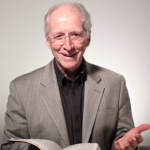 ARMINIANISMS by Dr. J. I. Packer:
ARMINIANISMS by Dr. J. I. Packer:
Within the churches of the Reformation, the terms “Calvinism” and “Arminianism” are traditionally used as a pair, expressing an antithesis, like black and white, or Roman and Protestant. The words are defined in terms of the antithesis, and the point is pressed that no Christian can avoid being on one side or the other. Among evangelicals, this issue, though now 350 years old (if not, indeed 1900 years old), remains live and sometimes explosive. “Calvinism” and “Arminianism” are still spat out by some as anathematizing swear-words (like “fundamentalism” on the lips of a liberal), and there are still places where you forfeit both fellowship and respect by professing either. There remain Presbyterian churches which ordain only Calvinists, and Methodist and Nazarene bodies which ordain only Arminians, and the division between “general” or “free-will” (Arminian) and “particular” or “Reformed” (Calvinistic) still splits the Baptist community on both sides of the Atlantic.
In evangelism, cooperation between evangelicals is sometimes hindered by disagreement and mistrust over this matter, just as in the eighteenth century the Calvinistic evangelicals and John Wesley’s party found it hard on occasion to work together. Nor is it any wonder that tension should exist, when each position sees the other as misrepresenting the saving love of God. The wonder is, rather, that so many Christian who profess a serious concern of the theology should treat this debate as one in which they have no stakes, and need not get involved.
This article seeks to understand and evaluate the Calvinist-Arminian antithesis. To that end, we shall address ourselves to three questions. First, what is Arminianism? Second, how far-reaching is the cleavage between it and Calvinism? Third (assuming that by this state we shall have seen reason to regard Arminianism as a pathological growth), what causes Arminianism? and what is the cure for it?
Before we tackle these question., however, on caveat must be entered. Our concern is with things, not words. Our subject matter will oblige us to speak of Calvinism and Arminianism frequently, but it is not part of our aim to revive bad habits of slogan-shouting and name-calling. [1] What matters is that we should grasp truly what the Bible says about God and His grace, not that we should parade brand labels derived from historical theology. The present writer believes, and wishes other to believe, the doctrines commonly labelled Calvinistic, but he is not concerned to argue for the word. One who has received the biblical witness to God’s sovereignty in grace is blessed indeed, but he is no better off for labeling himself a Calvinist, and might indeed be that worse for it; for party passion and love of the truth are different things, and indulgence in the one tends to wither the other.
WHAT IS ARMINIANISM [2]
Historically, Arminianism has appeared as a reaction against the Calvinism of Beza and the Synod of Dort, affirming, in the words of W. R. Bagnall, “conditional in opposition to absolute predestination, and general in opposition to particular redemption.” [3] This verbal antithesis is not in fact as simple or clear as it looks, for changing the adjective involves redefining the noun. What Bagnall should have said is that Calvinism affirms a concept of predestination from which conditionality is excluded, and a concept of redemption to which particularity is essential; and Arminianism denies both. The difference is this. To Calvinism predestination is essentially God’s unconditional decision about the destiny of individuals; to Arminianism it is essentially God’s unconditional decision to provide means of grace, decisions about individuals’ destiny being secondary, conditional, and consequent upon foresight of how they will use those means of grace. To Calvinism, predestination of individuals means the foreordaining of both their doings (including their response to the gospel) and their consequent destinies; to Arminianism it means a foreordaining of destinies based on doings foreseen but not foreordained. Arminianism affirms that god predestined Christ to be man’s Savior, and repentance and faith to be the way of salvation, and the gift of universal sufficient inward grace to make saving response to God possible for all men everywhere, but it denies that nay individual is predestined to believe. On the Calvinist view, election, which is a predestinating act on God’s part, means the efficacious choice of particular sinners to be saved by Jesus Christ through faith, and redemption, the first step in working out God’s electing purpose, is an achievement which actually secures certain salvation – calling, pardon, adoption, preservation, final glory – for all the elect. On the Arminian view, however, what the death of Christ secured was a possibility of salvation for sinners generally, a possibility which, so far as God is concerned, might never have been actualized in any single case; and the electing of individuals to salvation is, as we said, simply God noting in advance who will believe and so qualify for glory, as a matter of contingent (not foreordained) fact. Whereas to Calvinism election is God’s resolve to save, and the cross Christ’s act of saving, for Arminianism salvation rests in the last analysis neither on God’s election nor on Christ’s cross, but on a man’s own cooperation with grace, which is something that God does not himself guarantee.
Biblically, the difference between these two conceptions of how God in love relates to fallen human beings may be pinpointed thus. Arminianism treats our Lord’s parable of the Supper to which further guests were invited in place of hose who never came (Luke 14:16-24; cf. Matt. 22:1-10) as picturing the whole truth about the love of God in the gospel. On this view, when you have compared God’s relation to fallen men with that of a dignitary who invites all needy folk around to come and enjoy his bounty, you have said it all. Calvinism, however, does not stop here, but links with the picture of the Supper that of the Shepherd (John 10:11-18, 24-29) who has his sheep given him to care for (vv. 14, 16, 27; cf. 6:37-40; 17:6, 11f), who lays down his life the them (10:15), who guarantees that all of them will in due course hear his voice (vv. 16, 27) and follow him (v. 27), and be kept from perishing forever (v. 28). In other words, Calvinism holds that divine love does not stop short at graciously inviting, but that the tri-une God takes gracious action to ensure that the elect respond, On this view, both the Christ who saves and the faith which receives him as Savior are God’s gifts, and the latter is as much a foreordained reality as is the former. Arminians praise God for providing a Savior to whom all may come for life; Calvinists do that too, and then go on to praise God for actually bringing them to the Savior’s feet.
So the basic difference between the two positions is not, as is sometimes thought, that Arminianism follows Scripture while Calvinism follows logic, nor that Arminianism knows the love of God while Calvinism knows only his power, nor that Arminianism affirms a connection between believing and obeying as a means and eternal life as an end which Calvinism denies, nor that Arminianism discerns a bona fide “free offer” of Christ in the Gospel which Calvinism does not discern, nor that Arminianism acknowledges human responsibility before God and requires holy endeavor in the Christian life while Calvinism does not. No; the difference is that Calvinism recognizes a dimension of the saving love of God which Arminianism misses, namely God’s sovereignty in bringing to faith and keeping in faith all who are actually saved. Arminianism gives Christians much to thank God for, and Calvinism gives them more. Continue reading →
 Interview with Dr. John Piper: Watershed Differences Between Calvinists and Arminians (original source here)
Interview with Dr. John Piper: Watershed Differences Between Calvinists and Arminians (original source here) 
